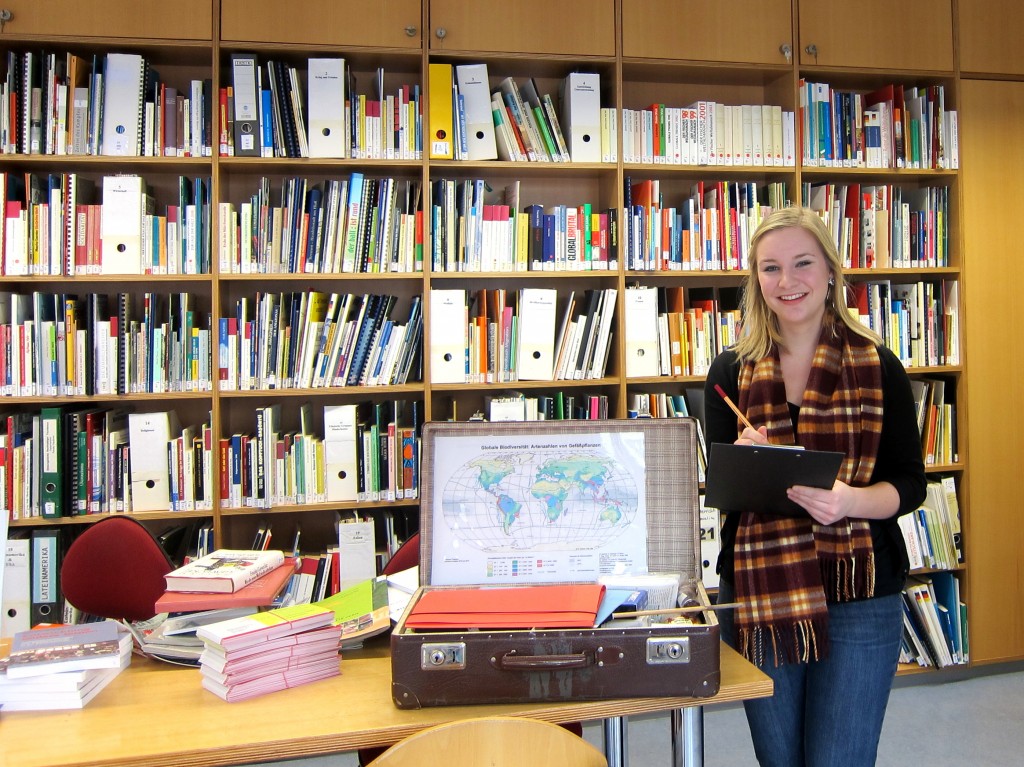by Julie King ’12
On the evening of March 30th I hopped on my bicycle and ventured into town to the Haus der Wissenschaft, or simply, the House of Science, in order to go to an event that is part of a series of environmentally themed lectures throughout the spring and summer. The translated title of the event was “The University in the city: Are we running out of juice?” The two-hour event consisted of three lecturers, with slightly different themes relating to the shortage of resources and the development of renewable energy in Bremen, and a question-and-answer based discussion at the end.
The first lecturer and chairman of BUND Bremen (BUND= the German Association for the Environment and Nature Conservation), Klaus Prietzel, talked about “peak oil” and its implications on the environment, but mainly its implications on the energy industry. The term “peak oil” refers to the point at which global oil extraction reaches its maximum. Scientists disagree on the when peak oil will happen; the conventional consensus is for the year 2020, whereas more radically optimistic scientists predict 2035. Some scientists maintain that we have already passed the tipping point, which occurred in 2006. Because of the number of environmentally related events and sciences classes I have attended in high school and at Dickinson, Herr Prietzel’s presentation did not contain much that I hadn’t heard before. Some of his interesting points included the inefficiency and risks of oil dependence. For example, automobiles lose 80% of oil-produced energy through heat-loss and most houses lose around 95%. I found Herr Prietzel’s analogy of oil as a drug as particularly accurate: it’s dangerous, addictive and an expensive habit. Dangerous both environmentally and politically, especially consider 97% of the oil consumed in Germany is imported. In his conclusion, Herr Prietzel admitted that oil is important to the economy of Bremen, considering the economic roles of Mercedes-Benz and Daimler and the shipping harbors in Bremen and Bremerhaven. Peak oil is a kind of crisis, but also an opportunity for positive change. Herr Prietzel asserted the importance of finding a substitution for oil, but admitted that the answer does not lie in biomass renewable energies or natural gas, but in renewable energies from sun and wind. More importantly, though, is the transition to lifestyles of lower energy consumption.
The second lecturer, Dr. Torsten Köhne, provided an interesting perspective as a board member of SWB, the energy company in Bremen. His lecture, titled “Sind nicht knappe Ressourcen vielleicht auch eigentlich knapp?” which translates roughly to “Are not scarce Resources actually in short supply?” Dr. Köhne’s presentation was a little harder for me to follow because of the speed at which he talked and the density of information on his slides. He started by talking about the importance of coal in the energy industry, its high costs and its damage to the environment. He then moved on to the prospect of renewable energies and I loved his quote “Die Sonne schickt uns keine Rechnung” – “The sun doesn’t send us a bill.” In order to power the city of Bremen sustainability, we would need 900 wind turbines, 60 square kilometers of solar panels, or 325 square kilometers of corn or turnips for biomass fuels. The problem is that we lack the surface area, capital, and public power supply infrastructure to achieve any of those options, and even more crucial is the public will for and acceptance of such an idea. He ended with the reality of the energy industry: decisions and initiatives are based on politics and money more so than what is best for the environment.
The last lecturer, Michael Flitner, was a Professor from ARTEC the Sustainable Research Center of the University of Bremen. His presentation was “Wege zu 100% erneubarem Strom” or “The Way to 100% Renewable Energy.” His basic point was just that our greatest need at the moment is more research, but by combining the energy production of on- and off-shore wind turbines, solar panels, hydroelectric means, and gas-forming bio masses Germany could be powered by only renewable energy by 2050. It could be possible that I missed the means to Professor Flitner’s “end” because of language problems, but I’m pretty sure his presentation only really argued for the need for research and public support to realize his plan – which seems fantastic, but ambitious.
The question and answer session at the end was interesting. The old man next to me brought up a great question – What about all of the energy consumption that can’t be plugged in? The consumption that for now can’t use renewable energy, like planes for example. The answer to his question was just that we need more research and more changes in technology. Another highlight of the discussion was a man who was getting rather heated in his “Why can’t we be more like Denmark?”- speech. Apparently the smaller country to the north already has succeeded in the transition to substantial energy production from wind power. Needless to say, even if Germany is not quite up to par with Denmark, the event at the House of Science was worth attending and I feel quite accomplished for having understood such topics. My dream job would be to work for a German-based renewable energy company, so now at least I know there may be a job for me out there somewhere.

